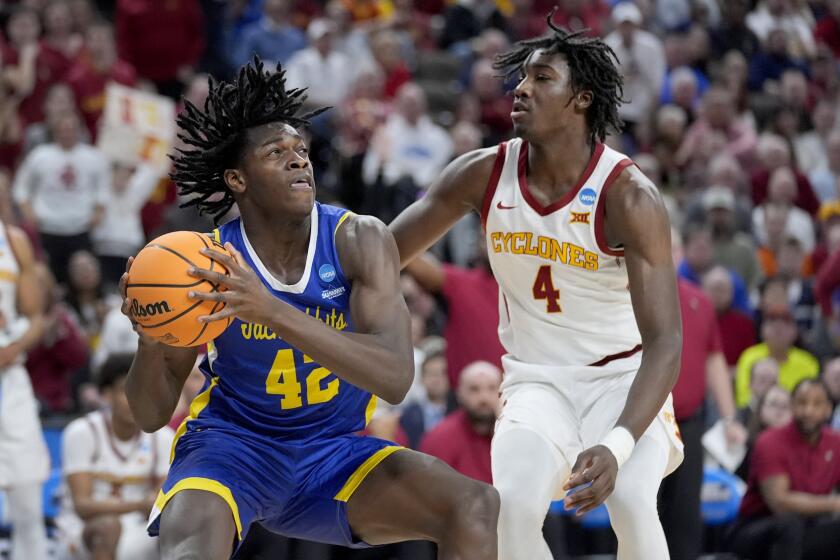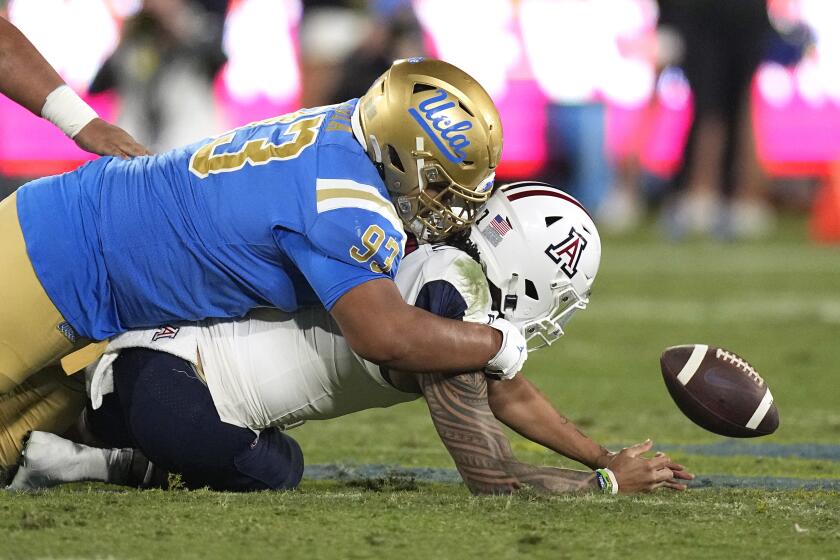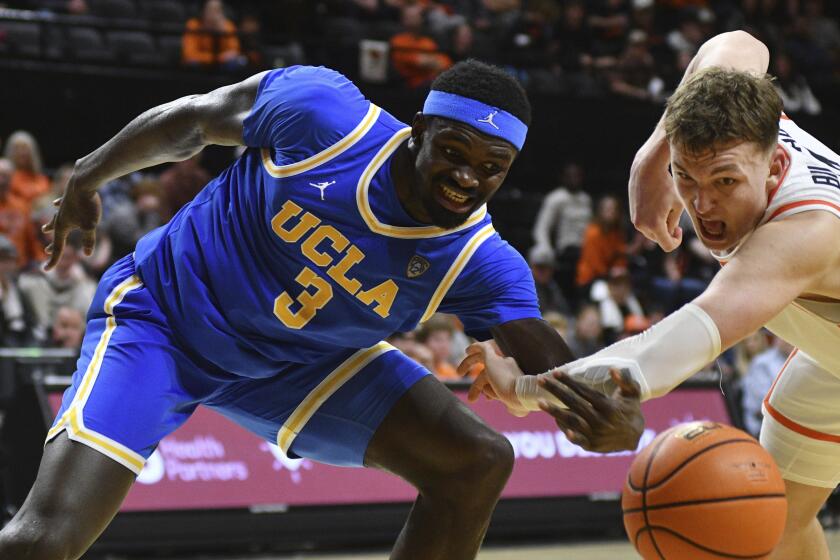Bruins will never inspire if they don’t aspire to it
There was no cloak of depression blanketing the UCLA campus Monday, no angry outburst from the football coach. And that’s the problem.
Two days after the Bruins let a potential season-making victory at Notre Dame escape from their grasp, students passed out fliers on Bruin Walk, tossed a Frisbee on the lawn and discussed upcoming tests, while Karl Dorrell told a roomful of reporters that things are getting better.
“We know that we’re close,” Dorrell said.
Not really. Saturday’s 20-17 loss to Notre Dame showed just how far away UCLA is from being thought of as an elite team.
First the stakes. Remember last year, when USC appeared to be doomed in South Bend? It felt as if a three-year run was about to be toppled and the world as we knew it was about to end. Then the Trojans found a way to win.
For UCLA, beating Notre Dame in and of itself would not have been enough to make this a great season. A BCS bowl game and a Pacific 10 Conference championship were already Cubs-win-World-Series improbable after losses to Washington and Oregon. Then the Bruins found a way to lose to the Irish, despite holding a four-point lead and the ball in the final two minutes.
For a team with great aspirations, this would have been a breaking point. Dorrell would have snapped.
He gave a hint of heading that way Monday when he said, “Everything was about what we thought it was” -- shades of Arizona Cardinals Coach Dennis Green’s “The Bears were who we thought they were” meltdown last week. But Dorrell kept his composure and even said, “I’m not going to throw the microphone.”
No, it wouldn’t be in character. But something needs to change.
People suggested a victory over 10th-ranked Notre Dame would have been a defining moment for Dorrell’s program. In reality, the defeat is even more indicative of where it’s been and where it stands.
Under Dorrell the Bruins are 3-10 against top-25 opponents, 1-6 vs. opponents in the top 10. And you have to wonder whether the coaching staff will enable the team to take the next step.
The coaches did a good job of preparing their players for this big game, getting them mentally and emotionally ready for the challenge of playing in Notre Dame Stadium. But after the kids did everything that could be asked of them, the coaches didn’t give them the chance to finish the job.
Sloppy game management, including tardiness in getting plays called, forced UCLA to use its final timeout with nine minutes left in the fourth quarter. That came into play later, when the Bruins tried to milk the clock with a four-point lead. On third down the Bruins looked disorganized, but had to hurry the snap before the play clock expired because they had no way to stop it. Quarterback Patrick Cowan wound up dumping the ball to Marcus Everett for a two-yard gain, four yards shy of a first down.
The Bruins’ defense gave UCLA a second chance by stopping Notre Dame’s Brady Quinn short on a fourth-down quarterback sneak. That’s when the coaches really gagged, calling three consecutive running plays despite a Notre Dame defense that was bunched at the line of scrimmage as if the players never broke the huddle.
The Bruins didn’t have a chance. Chris Markey ran for no gain, a three-yard gain, and a loss of two.
Monday, Dorrell said he had no regrets about the approach, only about the results.
“I wish I would have called plays that worked,” Dorrell said. “We had opportunities to make it work, and we didn’t execute it right. That’s coaches and players. We didn’t put our guys and coaches in the best position.”
There were valid arguments for running: avoiding turnovers, avoiding clock-stopping incomplete passes and forcing Notre Dame to use its timeouts.
But this statement by Dorrell made no sense: “Also in our thought process was we wanted to go right at ‘em. We wanted to go out and test what we had at that given time.”
Going right at ‘em hadn’t worked all day; the Bruins had already failed that test. Not including that three-and-out drive, UCLA averaged one yard per rush in the game. By contrast, the Bruins averaged 6.8 yards per pass attempt, and 13.6 yards per completion. Nine of UCLA’s 12 first downs came on passing plays. It was pretty clear: if they wanted a first down that would almost assure a victory, they had to pass.
Even after punting into the end zone for a touchback, the Bruins had the odds on their side. Notre Dame had to go 80 yards with no timeouts in just over a minute.
But once again the Bruins didn’t go with what worked, sticking with a standard four-man rush instead of the blitzes that were so effective earlier. I’ve had trips to the DMV that took less time than Quinn had in the pocket on that last drive, allowing him to pick apart the defense with three passes for the winning score.
To UCLA’s credit, no one pointed fingers. Safety Dennis Keyes said Jeff Samardzija’s winning touchdown reception and run was his fault. Center Robert Chai said it was the offensive line’s fault for not clearing holes on the previous possession.
“You can’t really blame the [coaching] staff for anything, because there’s plays offensively and defensively that we should have made,” defensive end Bruce Davis said. “They called a good game. The players have just got to execute.”
The players did execute for 59 minutes. They did what they were told. But when it mattered most, they weren’t told the right things.
Dorrell didn’t pass off any critical decisions on his coordinators. That’s why three words he said Monday carried the most weight: “Ultimately, it’s me.”
*
J.A. Adande can be reached at j.a.adande@latimes.com. To read more by Adande go to latimes.com/adandeblog.
Go beyond the scoreboard
Get the latest on L.A.'s teams in the daily Sports Report newsletter.
You may occasionally receive promotional content from the Los Angeles Times.



